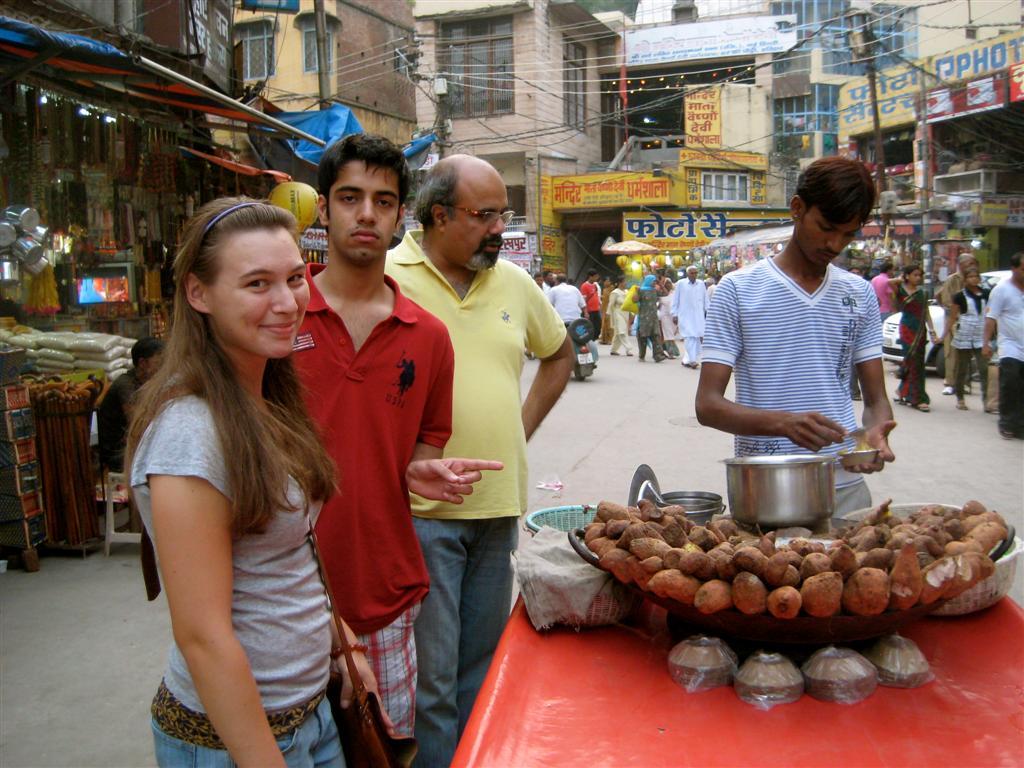At age fourteen, senior class member Sedona Chinn left her home outside San Diego to attend boarding school in New Hampshire. She admitted that she feels as though she is constantly leaving home.
After spending ten months studying and travelling in the nation of India, Chinn has once more returned home to Saint Anselm College.
Chinn left for New Delhi in July of last year and returned this past May. She admitted that she was ready to come home to the United States.
Chinn acknowledged that her experiences in India helped shape her as an individual. She explained further, however, that she has yet to arrive at a satisfactory means of expressing how her time spent in India affected her.
“It was a vast experience,” Chin said, “It’s hard to talk about because I have nothing to compare it to.”
Chinn’s difficulty in classifying the experience is undoubtedly a result of India’s vastly diverse culture and geography. India is simultaneously a country of great wealth and great poverty, of opportunity and of desperation, of cultural richness and human tragedy.
Chinn explained “If you say one thing about India, you are almost obliged to also say the opposite.”
And Chinn speaks from a satisfactory position of authority. She spent nearly two months of her time in India travelling.
Chinn’s extensive journey brought south to the lush coastal state of Kerala (the home state of Saint Anselm English professor Bindu Malieckal) to the mountainous northerly region of Ladakh.
Chinn also made a brief foray into Nepal, where she was afforded an opportunity to meet the Dali Lama. In Nepal, she also met up with Saint Anselm alumnus James Flaherty ’12. The pair toured the country together.
During her stay in Nepal, Chinn witnessed a protest against Chinese occupation of Tibet. The Nepalese protesters gathered in solidarity with Tibetan protesters, some of whom have resorted public self-immolation.
This experience proved valuable to Chinn. It served as inspiration for an academic research paper.
Chinn also travelled for two weeks with her mother, with whom she visited tourist destinations like the Taj Mahal.
Chinn spent a portion of her time abroad alone and contentedly so. She said “It’s empowering to deal with such uncertainty on your own.” She laughed, “there were times of panic, too.”
Travelling abroad can be both exhilarating and terrifying. Chinn, described the alien wonder of walking down a crowded Indian street, swarmed and bustling traffic, pedestrians, assorted livestock, and, on occasion, an elephant.
She spoke also of her time spent in the foothills of the Himalayas, where she glimpsed the towering façade of Mount Everest.
She recalled three days spent in a Nepalese medical clinic with less reverence. Chinn fell severely ill with food poisoning after buying ice-cream from a local vendor.
She also described a particularly memorable train ride throughout which she was obliged to share a cramped car with a mischievous group of young soccer players. The high-school aged boys entertained themselves by making kissy-faces. For the boys, the novelty of the stunt never wore off. They kept at it for the duration of the five hour ride.
When Chinn was not travelling, she devoted time to her studies at the Lady Shri Ram college for Women, a subsidiary school of the University of Delhi at New Delhi. There, she took courses in history and philosophy.
Chinn also enrolled in a graduate-level course entitled Conflict Transformation and Peace Building. Chinn admits that her class schedule was somewhat chaotic.
Chinn’s living arrangements on campus were equally chaotic, at least by Western standards.
She explained that the rooms were half the size of a standard Dominic Hall or Joan of Ark Hall dorm room. Four students were expected to share this small space.
“We international students were lucky,” she explained, “we had a private bathroom with a western toilet. She further revealed that the shower, sink, and toilet were all contained in the same tiny room. Hypothetically, one could complete one’s entire morning routine without changing position.
Local Indian students were allotted more primitive accommodations. They were expected to bathe with buckets of bathwater and washcloths.
“The power in the dorm would go out intermittently,” Chinn stated, “but we did have hot water in the winter, which was great.”
Chinn described her district of New Delhi as a more posh section of town. Even so, Chinn explained, there is poverty everywhere in India.
One afternoon, Chinn was sitting in a café beside a pleasant public square. She was surprised when a man on a nearby park bench began to undress. After stripping to his skivvies, he began to wash himself under a nearby hose. Among Indian men and children, Chinn said, public displays of this sort are not considered taboo.
“It took me almost a year acclimatize to India,” Chinn said. “Because of the sheer number of people, it is impossible to enforce traffic laws, to ensure everyone goes to school, to subdue crime.”
As a result of India’s extraordinarily massive and diverse population, the nation cannot be strictly regulated in the same fashion that western countries are regulated.
While Chinn is uncertain about how to classify her experience in India, she took time to mention one particular development in her own perspective that she had noticed. She said “India strips away the lesser concerns, worries, and preoccupations. It reminds you of necessities.”
While Chinn is pleased to be back in the United States, she also admitted that she is beginning to get itchy feet. She plans on continuing her world travels. She hopes to find herself in Southeast Asia or Africa.


